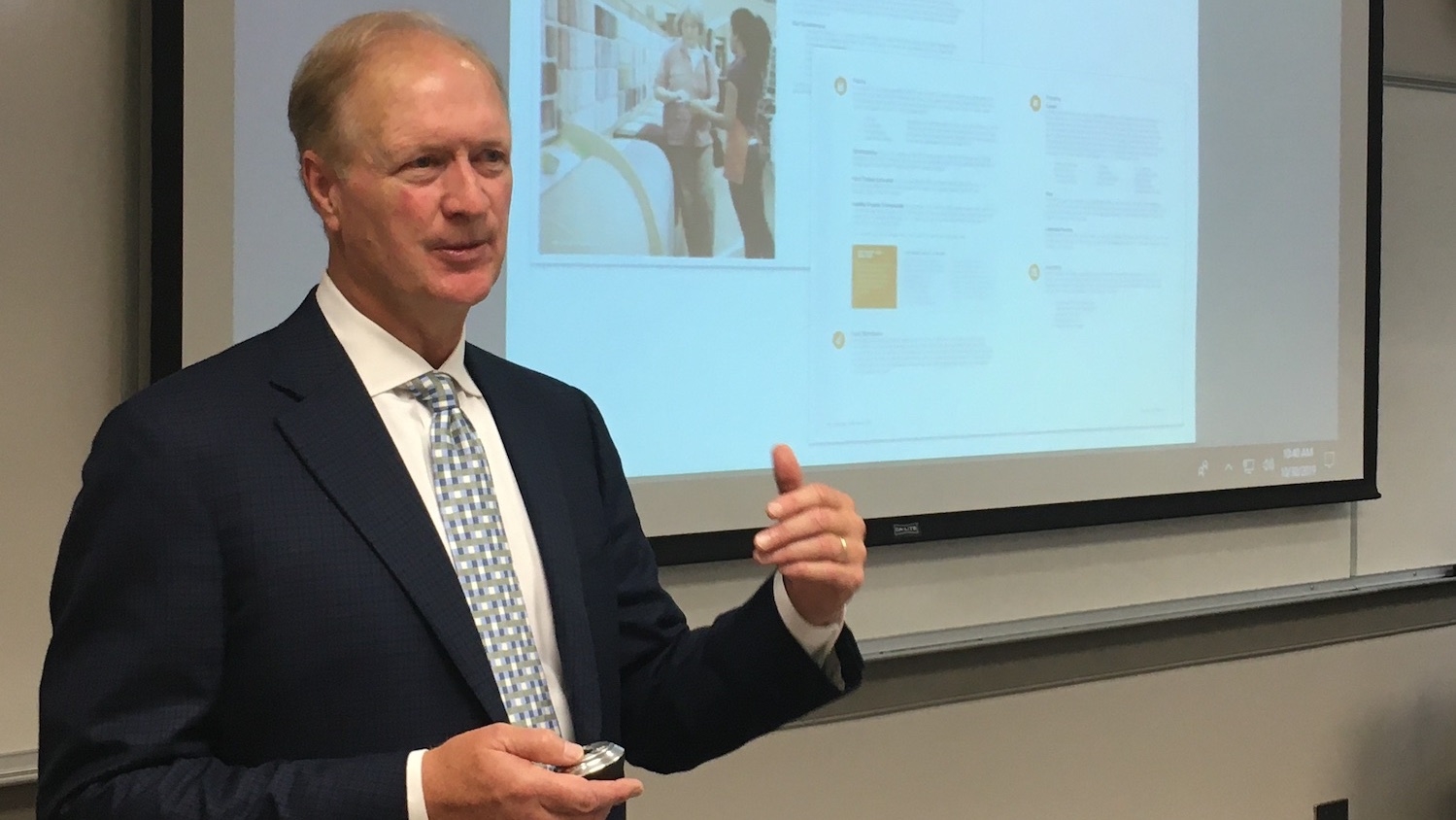Home Depot’s Jarvis Pushes Practicality in MBA 582 Guest Lecture

Home Depot Chief Sustainability Officer Ron Jarvis gave a no-frills lecture about accomplishing corporate sustainability objectives in Jessica Thomas’ MBA 582: Sustainability and Business course Oct. 30 at Nelson Hall.
Jarvis’ visit was part of a guest-lecturer series in MBA 582 that has included 12 speakers during the fall 2019 semester. Jarvis’ role as the sustainability lead at Home Depot fits in nicely to the vision Jessica Thomas, director of the Business Sustainability Collaborative at Poole College of Management, has for the series.
“My goal with the guest lecture series in MBA 582 is to showcase examples of how visionary business leaders are using sustainable business strategy to drive innovation and impact,” Thomas, who was reached by email, wrote.
It doesn’t hurt that Jarvis is also a 1983 graduate of NC State University, with a bachelor’s degree in business management.
“I first got to know Ron [Jarvis] about two years ago when the Business Sustainability Collaborative was partnering with the NC Clean Energy Technology Center to identify a keynote for the 2018 North Carolina State Energy Conference,” Thomas wrote. “I reached out to him with an invitation to return to campus to share the impact of his work with hundreds … . He graciously accepted the invitation and we’ve been trying to find a good reason to bring him back to campus since then.”

Jarvis’ experience in home-improvement retail goes pretty far back. After a 12-year stint at Lowe’s, he joined Home Depot in 1995 and has been there ever since, serving in various managerial and executive roles.
That thorough experience in an industry that relies on sustainable sourcing and is frequently subject to external pressure allowed him to speak with the grounded expertise Thomas assumed he would provide.
“One thing in the corporate world, you can’t be rigid,” Jarvis said. “You got to be flexible. You got to roll with the flow.”
He went on to speak about how he fell into his sustainability role, the products and sourcing his team has transformed and the importance of practical application.
“Take the path of practical application, getting stuff done,” he said. “And if you do, you’ll have a lot more credibility with a company.”
In an interview following the lecture, he explained that practical application means focusing on the market-applicable areas of sustainability in which the greatest impact can be achieved, not spending time and money on the “shiny objects,” the trendy topics.
“It’s saying, ‘I hear ya. I hear all the stuff that you’re doing’,” Jarvis said. “But let’s talk about what’s practical. Where does the rubber meet the road, and what does it mean?”
For example, he said, while converting straws from plastic to paper is a noble effort, the small percentage of plastic in the oceans that comprises straws makes the effort secondary to, say, the emissions produced by load-and-go trucks.
“That’s something we can impact,” Jarvis said, “so let’s focus on that instead of whatever is the environmental flavor of the day.”
Practical application also extended to the course and its students given the collaboration on a case study between MBA 582, Jarvis and Home Depot.
“The case [study] will be designed as a teaching tool to help future business leaders, inside and outside of Poole College, understand the complexities of making strategic sustainability decisions that can have significant implications for employees, customers, suppliers and other key stakeholders,” Thomas wrote.
Making those impactful sustainability decisions, Jarvis said, are more achievable at the corporate level given the resources and the greater possibility of affecting large-scale issues.
“In a corporation, you can make things happen,” he said. “If you have that reputation and the rest of the company knows that you understand the business and you’re not going to do something they can’t back, then you have credibility.”
He also thinks, contrary to the traditional profit-driven position, that one of the main purposes of business is to be sustainable.
“I believe the business of business is sustainable business,” Jarvis said, riffing on economist Milton Friedman’s argument that the only social responsibility of business is to expand its profitability.
For Home Depot, a major provider of construction materials in the U.S., that makes perfect sense, especially in light of its chief sustainability officer’s practical mindset.
“If you’re saying the right thing to do is to be a responsible corporation and a sustainable corporation, then, yeah, take the chemicals out of the paint that’s harming us — that we can do,” Jarvis said. “It’s not going to change the way it works or the cost. Just do it.”
That notion of activating one’s principles and tackling a company’s sustainability issues are what Jarvis most wanted students to retain.
“Don’t wait for somebody else to do it,” he said. “Just do it.”
That emphasis aligned with the purpose of MBA 582 to explore the ways in which businesses drive innovation and build business value from sustainability practices, as well as the tools businesses use to successfully apply sustainability measures.
There was also that uncanny connection between Jarvis’ “just-do-it” perspective and the university and college’s think-and-do mentality, which made this collaboration all the more worth doing.
“If you end up in a sustainability position, take the mindset of the business,” he said. “Look at what they’re trying to do and do it for them. Because you can make it happen.”
- Categories: